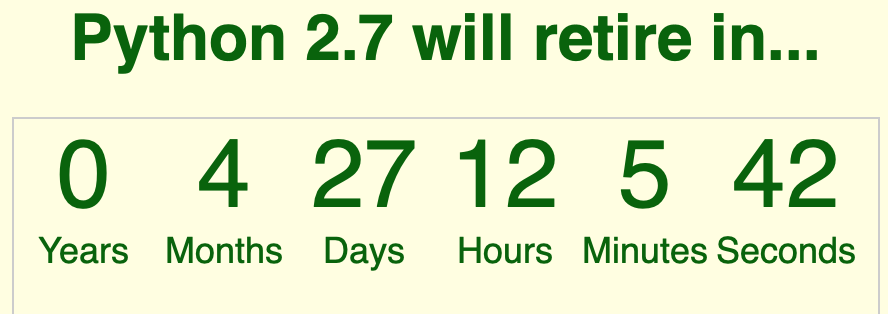End of Life

It amuses me somewhat to see the push to get people to stop using Python 2. Python 2 was sort of replaced with Python 3 in 2008. However, Python 3 broke backward compatibility, and Python 2 continued to be supported and even developed (some of the Python 3 features have even been backported to Python 2 which is somewhat bizarre). However, the official Python maintainers have declared January 1st, 2020 to be the end of life for Python 2. However, many Linux distos (as well as MacOS) still include Python 2 as the default.
The situation with Fortran is significantly different. You can still get (even purchase) a Fortran compiler that can compile obsolescent FORTRAN 77 written 40 years ago. A lot of people haven't gotten the memo that Fortran has moved on. Not a day goes by where there isn't a StackOverflow question from somebody about some godawful FORTRAN 77 code that they can't figure out how to get working. So, I wonder how successful this effort will be with Python. Will there still be Python 2 holdouts 30 years from now? Of course, the Python community is significantly different from the Fortran community (to whatever extent Fortran could be said to even have a community). The Python implementation is open source so people are free in theory to just fork it and continue to update it. But, as the official source dries up I suspect eventually people will just move on.
There is basically no one centralized place for Fortran users to learn about Fortran, download Fortran, work on or even comment on changes to Fortran, or anything else really. Backward compatibility is actually one of the major strengths of Fortran, but there just isn't anyone to tell you to move on. Many of the major Fortran libraries freely available on the internet are still, in 2018, written in Fortran 77 (see NetLib, where Fortran codes go to die). There is also SOFA and SPICELIB (two libraries still being developed in Fortran 77 for some reason). There is LAPACK, probably the most visible FORTRAN 77 library. It turns out, you can't even link LAPACK and SPICELIB in the same program anymore, because both now have a routine called DPSTRF! If these libraries weren't using this depreciated source form and were actually using Fortran 90 modules (or god forbid, Fortran 2008 submodules) we wouldn't have this problem. Nobody should be publishing a Fortran library at this point that is just a pile of subroutines. And yet, they do.
Sure, there is a Fortran standards committee. But they write the standard and don't do much else. There isn't any official website that serves as any kind of central location to learn about the language or download any compilers. There is no nonprofit "Fortran Foundation". There isn't even a Fortran logo. What we basically have is a few compiler vendors such as NAG, Intel, PGI, as well as the open source gfortran developers, each with their own websites and their own schedules. Even the C++ language (another ISO standard language) has a GitHub site and even an actual homepage. The Fortran committee website is extremely underwhelming, and is basically just a list of links to plain text files that have meeting minutes and some other documents. The odds of a new user even finding this site are pretty slim (and of course, there really isn't anything useful here anyway). The Fortran standards process seems very opaque (I guess it involves infrequent meetings and typing up plain text files).
In many ways, the standards committee has failed the user base. The slowness of the language development process, the refusal to adopt modern practices of collaboration, and the refusal to address major shortcomings of the language has allowed other languages to overtake Fortran in the fields it was once dominant. In fields such as machine learning, one of the major computational activities of modern times, there is no significant presence of Fortran. The committee has given us incremental, somewhat half-baked features that don't really solve real-world problems in any kind of satisfactory manner (like ISO_VARYING_STRING, parametrized derived types, user-defined IO, floating point exceptions). While shortcomings from decades ago are left unaddressed (lack of a useful mechanism for generic programming, lack of access to the file system, no intrinsic high-level classes for dynamic structures such as stacks and queues, no useful varying string class, a non-standard module file format that is a constant source of annoyance for both users and library developers, even the lack of a standardized file extension for Fortran, which leads to nonsense like .f90, .f03, .f08, .f18? being used). It's incredible but true that the Fortran standard doesn't actually define a file extension to be used for Fortran. One of the respondents to a recent survey on Fortran language development had this to say:
The standard committee is too inbred with compiler developers who only see the language from the inside out and lacking in users who know what features they need for their particular application space.
Amazing libraries in the scientific/technical/numerical domain are being written in other programming languages. DifferentialEquations.jl is the type of high-quality math-oriented library that no one is writing anymore in Fortran (indeed it makes use of features of Julia that aren't even possible in Fortran). This article about using Julia as a differentiable language is the sort of thinking we desperately need in the Fortran world. Not more excuses about why fundamental changes can't be made to Fortran for fear of breaking somebody's 60 year old spaghetti code.
See also
- Ben James, Stop Using Python 2: What you Need to Know About Python 3, August 15, 2018 [hackaday.com]
- https://pythonclock.org
- PEP 373 -- Python 2.7 Release Schedule
- M. Innes, et. al., Building a Language and Compiler for Machine Learning, Dec 3, 2018 [julialang.org]
- Some ideas for Fortran, from a newbies perspective, July 22, 2019 [comp.lang.fortran]